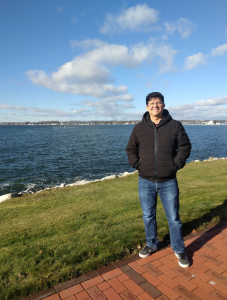
By Mengyang Zhou
Felipe Soares shared his career journey as an ocean modeler, his experiences, challenges, and the key role he plays in advancing ocean modeling research in the Coastal Biogeochemistry Dynamics Laboratory in our department.
Mengyang: Can you tell us about your career path?
Felipe: So, let me start from the very beginning. I was always passionate about nature and marine life and had an inclination to be a marine biologist. But when the time arrived to choose a career, I found myself very uncertain. One day my mother suggested that I take a look at the Oceanography course at the Rio de Janeiro State University (UERJ). Initially, it sounded very unconventional to me, and I basically disregarded it. However, after reading about it in a career guidebook it captivated me and suddenly, I couldn’t envision any other option. While I was an Oceanography undergrad student at UERJ, I actively sought opportunities in research labs, and that led me to acquire some skills and expand my network beyond the university. This pursuit led me to get an internship at the IEAPM (a Brazilian Navy research institute) and subsequently at Prooceano, a growing and already well-established oceanography consulting company in Rio de Janeiro in the late 2000’s. So, at this point my career was already leaning towards the industry. Over the next twelve years, I worked at this company, playing a pivotal role in ocean modeling, which involved extensive model preparation, running, and evaluation. Simultaneously, I pursued my master’s at the Rio de Janeiro Federal University (UFRJ) studying the seasonality of the Brazil Current mesoscale activity. Upon discovering an open position at Sam’s lab, which required expertise aligned with my experience, I researched her work. The multidisciplinary aspect of the work was particularly appealing to me, presenting an opportunity to get out of my comfort zone, acquire new skills, and enrich both my career and life. Consequently, I joined the DMS (Department of Marine Sciences) to work at the Coastal Biogeochemistry Dynamics Lab in August 2021.
Mengyang: What’s your current position in our department?
Felipe: I am currently a research assistant II, contributing to almost all projects within Sam’s lab. As a technician in a modeling lab, my responsibilities involve running the models, conducting data analyses, comparing the model results with observations, and generating plots and statistics. These outputs are used in presentations, papers, daily research activities, etc.
Mengyang: What do you enjoy most about your current position, and what are the most challenging parts about this job, if any?
Felipe: I like tackling problems that demand both programming skills and oceanographic knowledge. This often involves managing large datasets and highlighting the information that will be useful for the scientists in a plot (and maybe make them visually appealing too). Additionally, by participating in diverse and engaging research projects you can learn a lot and be incredibly fulfilling. The most challenging part is the responsibility of overseeing model runs which are often the primary source of data for the lab’s projects. Any technical problems or configuration errors can significantly impact the lab’s research schedule and objectives.
Mengyang: What do you do outside of work for fun, to balance life and work?
Felipe: Outside of work, I love spending time in nature. Whether it’s hiking with my family or fishing in the streams (and hopefully back to trail running soon), you can probably find me exploring the parks in eastern CT during weekends. Soccer is also another passion (or maybe a religion) for me. I am glad that I can follow all Vasco da Gama matches in the Brazilian league from the US, and that there’s an awesome soccer group in the DMS that plays every Friday here at Avery Point.